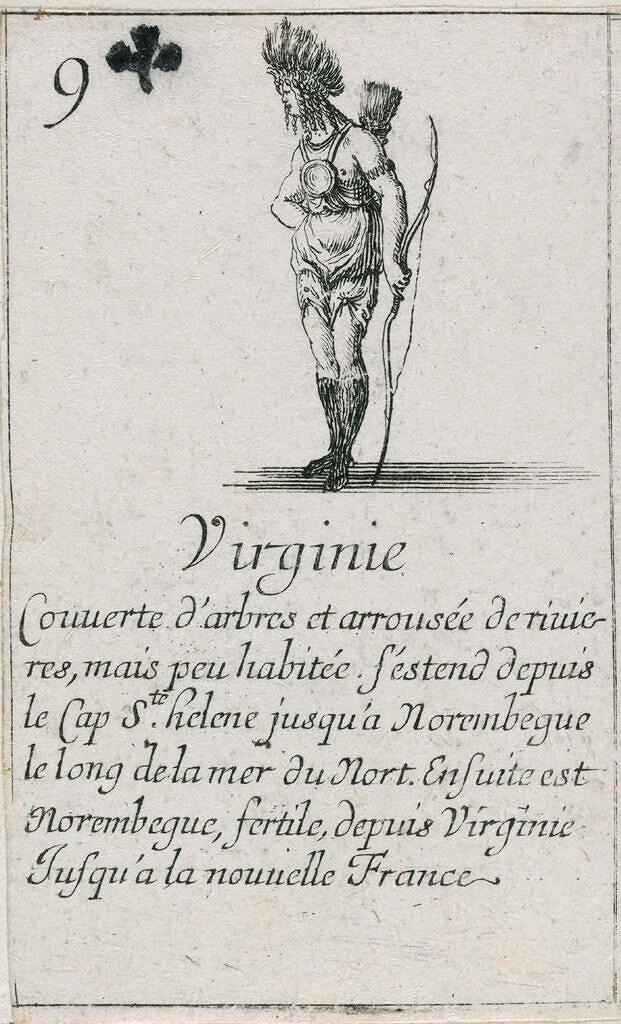Militia

Stefano Della Bella: Virginia (17th century)
"Eye for an eye justice ruled the rough Western edge of our emerging nation."
Some accounts describe Flower Swift as a Quaker, while others report he was likely Baptist. Such distinctions made little difference along Virginia's Western Frontier in the last quarter of the eighteenth century. Swift's wife, Mary Bedsaul, was most certainly a Quaker, having come from an acknowledged Quaker family, and it's recognized that the militia company Swift led, first as a Captain and then later as a Colonel, was labeled a "Quaker" company. He might have been deemed qualified to serve to lead Quakers because he had Quakers in his extended family. Quakers might seem unlikely members of any military force, for even in colonial times, they refused to take the otherwise required oath of allegiance to the Commonwealth:
"We whose names are hereunder subscribed do swear that we renounce all allegiance to George Third, King of Great Britain, his heirs’ successors, and that I will faithfully bear the true allegiance to the Commonwealth of Virginia as a free and independent State and that I will not at any time do or Cause to be done any matter or thing that will be made known to some one Justice of the Peace for the said State all treasons or traitorous Conspiracies which I now or hereafter shall know to be framed against this or any of the United States of America."
Others refusing to take this oath were accused of supporting the King and jailed unless they or their family members agreed to serve with the Continentials or the local militia. Extreme hard cases were summarily executed for treason if they refused to take the oath. The records suggest that only about a third of the inhabitants of Western Virginia were staunch supporters of the revolution. A third probably supported the King and either kept their convictions to themselves or fled to places where the British could better protect them from the wrath of their fellow citizens. A third didn't care either way and just wanted to be left alone. Serving in the local militia proved one way to demonstrate loyalty or disprove overt disloyalty.
Quakers would not agree to join any standing army, for they would not fire upon enemy soldiers, with one exception. Western Virginia was never in danger of being overrun by the British Army. That territory was self-contained and could do little damage to British interests; many of its inhabitants were on the lam from the British in the first place. One threat remained throughout the conflict, though, and that was the continuing threat posed by the native inhabitants of the district. Since Swift's immediate neighbors were largely unaffected by the tyrannies New Englanders protested, the Crown's presence affected only two pivotal parts of frontier existence, which the settlers considered existential. The Crown controlled which "Indian Lands" would be open for settlement. The settlers wanted to go wherever the Hell they chose. The Crown also controlled who the settlers could sell their exports to and determined the price. The settlers wanted to sell to whomever they wanted at a fairly-negotiated price. For those on the frontier, the decision to join the revolution was economic rather than ideological.
The frontier militia units Flower Swift led served as the local constabulary. Swift's grandfather had been a constable in Frederick, Maryland before his father Thomas moved the family to North Carolina, so I suspect the role might have run in the family. The Quaker Militia's primary job involved patrolling the border country to keep the natives in check. It remained common for natives to seek revenge against settlers who confiscated their land, regardless of whether The Crown had given permission. The natives would take a cow as naturally as a settler might take a deer and complain when the militia didn't agree to the comparison. The Quaker prohibition against shooting fellow humans did not appear to extend to include Indians, and the settlers of those days unabashedly claimed that the only good Indian was a dead one. Eye for an eye justice ruled the rough Western edge of our emerging nation. While their tidewater cousins fought the British, the frontier militia killed Indians.
©2024 by David A. Schmaltz - all rights reserved


